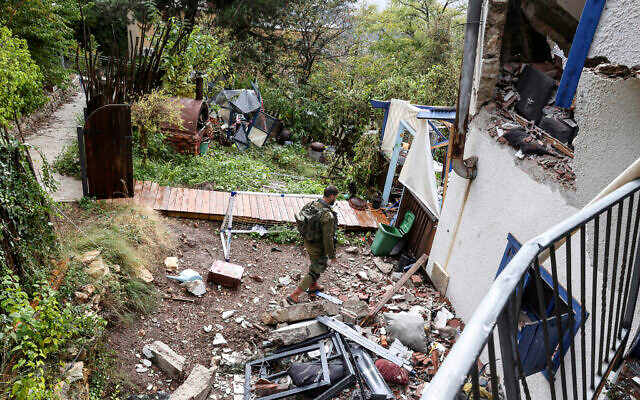
Hanegbi says threat of Lebanese terror group attempting Oct. 7-style massacre of civilians cannot be tolerated; says killing Sinwar in Gaza may expedite war’s end, hostages’ return
National Security Adviser Tzachi Hanegbi indicated on Saturday night that once Hamas is defeated in Gaza, Israel may have to go to war against Hezbollah across the northern border in Lebanon.
While the Jewish state has long been worried by the threat posed to Israel by Hezbollah’s missile arsenal, its prime concern in the wake of the slaughter of 1,200 people in southern Israel by Hamas on October 7, said Hanegbi, is that Hezbollah’s Radwan force could attempt a similar murderous invasion from the north, targeting civilians in communities near the border.
Israel, he acknowledged, was tackling Hamas “17 years too late,” and it could no longer dare to tolerate the danger of the prevailing situation in the north, with Hezbollah’s forces at the border.
Some 60,000 residents of border communities have been evacuated from the north since October 7, amid relentless and sometimes deadly clashes across the border between Hezbollah and Israel.
“Residents will not return if we don’t do the same thing” in the north against Hezbollah as is being done in the south against Hamas, Hanegbi told Channel 12 news in a lengthy interview on Saturday night.
“We can no longer accept [Hezbollah’s elite] Radwan force sitting on the border. We can no longer accept Resolution 1701 not being implemented,” he added, referring to a UN Security Council resolution from 2006, at the end of the Second Lebanon War, that barred any Hezbollah presence within almost 30 kilometers of the border with Israel.
Asked directly if there would be a war in the north, Hanegbi said: “The situation in the north must be changed. And it will change. If Hezbollah agrees to change things via diplomacy, very good. But I don’t believe it will.”
Therefore, he said, “when the day comes,” Israel will have to act to ensure that residents of the north are no longer “displaced in their land, and to guarantee for them that the situation in the north has changed.”
Hanegbi noted that while many countries have missiles pointed at Israel, including Iran, Syria and Iraq, “Israel doesn’t invade them.” The fear regarding Hezbollah’s Radwan force is that “within minutes,” it could cross the border and begin a murderous rampage in northern communities as Hamas did in the south on October 7. Israel cannot tolerate this threat any longer, he said.
Hanegbi said Israel does not want to fight simultaneously on two fronts, and indicated it would therefore tackle Hezbollah after Hamas is defeated. He said Israel has been “making clear to the Americans that we are not interested in war [in the north], but that we will have no alternative but to impose a new reality” if Hezbollah remains a threat.
In the same interview, Hanegbi said it was impossible to say how much longer the war against Hamas would last, but that it may be more than months.
“The Americans have not set any deadline,” he said, noting that on Friday the Biden administration denied imposing a time limit — although US Secretary of State Antony Blinken has reportedly told Israel’s leaders they have weeks to wrap up the current intensive phase of the fighting.
“They understand that they can’t tell the IDF how long it needs to achieve the goals,” said Hanegbi. “They share the goals of returning the hostages — a campaign that a date cannot be set for — and of destroying Hamas,” he said. “Therefore, the assessment [that achieving the goals of the war in Gaza] cannot be measured in weeks is correct, and I’m not sure it can be measured in months.”
Hanegbi said he believes Hamas’s Gaza leader Yahya Sinwar will want Hamas to fight to the end, “but if we kill him, and that’s the plan, it is possible that the leadership that succeeds him may understand that to avoid his fate, it will need to leave Gaza, defeated.”
He indicated that killing Sinwar, therefore, may be a key step toward achieving both war aims — destroying Hamas in Gaza and returning the hostages.
Hanegbi said that at least 7,000 terrorists have been killed during the war so far, and said the IDF was now very close to Hamas’s centers of command in Jabaliya and Shejaiya, two key Hamas strongholds in northern Gaza.
He said IDF efforts to rescue hostages were incredibly high-risk “because their captors are waiting with their fingers on the trigger.”
But “military pressure could produce another halt in the fighting” and the release of further hostages, he said.
